|
|
|
Sort Order |
|
|
|
Items / Page
|
|
|
|
|
|
|
| Srl | Item |
| 1 |
ID:
103973
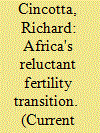

|
|
|
|
|
| Publication |
2011.
|
| Summary/Abstract |
Fertility decline and a maturing age structure typically prove more indicative of future human development . . . than do shifts toward economic or political liberalization. Why should it be any different south of the Sahara?"
|
|
|
|
|
|
|
|
|
|
|
|
|
|
|
|
| 2 |
ID:
132973
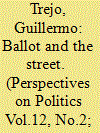

|
|
|
|
|
| Publication |
2014.
|
| Summary/Abstract |
This article presents a new explanation of the widespread occurrence of cycles of protest in electoral autocracies - the most common type of authoritarian regime in the world today. Because multiparty elections in autocracies are partially free but unfair, opposition parties are compelled to compete for office while contesting the rules of competition. To fulfill this dual goal, opposition parties actively seek to recruit a wide variety of independent social movements who can provide votes and lead major mobilizations during election campaigns and in post-election rallies to denounce fraud. Because electoral participation can cause divisions within social movements, social activists join socio-electoral coalitions when opposition parties offer them financial and logistic resources and institutional protection to mobilize for their causes during non-election times. This quid pro quo explains how isolated protest events become aggregated into powerful cycles of mobilization and why protest is more intense during elections but persists beyond election cycles. When political liberalization leads to increasingly free and fair elections, the prospect of victory motivates opposition parties to discourage radical mobilization, bringing cycles of protest to an end. Drawing on an original database of indigenous protest in Mexico and on case studies, I provide quantitative and qualitative evidence of the causal impact of electoral incentives on the rise, development and decline of a powerful cycle of indigenous protest as Mexico transitioned from one-party to multi-party autocracy and into democracy. Beyond Mexico, I show that the introduction of multiparty elections in a wide variety of autocracies around the world gave rise to major cycles of protest and discuss why the relationship between the ballot and the street is a crucial factor for understanding the dynamics of stability and change of authoritarian regimes.
|
|
|
|
|
|
|
|
|
|
|
|
|
|
|
|
| 3 |
ID:
129029
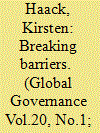

|
|
|
|
|
| Publication |
2014.
|
| Summary/Abstract |
The appointment of Christine Lagarde in 2011 to the leadership of the International Monetary Fund may have been a highlight for women's representation in international organizations, suggesting that the final glass ceiling for women in global governance has been broken. However, this article shows that leadership and representation by women in global governance continues to be curtailed by "glass walls" on the one hand, and flexible glass ceilings on the other. While women in UN agencies today stand on firmer floors, relying on a stronger institutional framework and increasing numbers of women working at all levels of the UN system, women are channeled into gender-specific portfolios, creating glass walls. Moreover, glass ceilings, once shattered, may indeed resettle as recent staff changes by Ban Ki-moon show. Thus, the picture of women's representation and gender equality in UN leadership is a mixed one.
|
|
|
|
|
|
|
|
|
|
|
|
|
|
|
|
| 4 |
ID:
128241


|
|
|
|
|
| Publication |
2013.
|
| Summary/Abstract |
On 30 November 2000 the UK Government enacted legislation leading to the formalisation of freedom of official government information (within specified bounds) for the UK voting public. The Freedom Information Act (FOI Act), although passed into law in 2000, did not come into full effect in the UK until January 2005. In order to 'police' the Act, the Information Commissioner's Organisation (ICO) was set up. The ICO is responsible for monitoring the performance of 43 government bodies1 against performance requirements under the FOI Act 2000. This includes a deadline for responding to initial Requests for Information (RFIs) of 20 working-days. The ICO also handles any unresolved2 complaints or disputes concerning non-disclosure or late release of information requested under an RFI.
To head the ICO, the new post of Information Commissioner was created in January 2001, subsuming the previous role of the Data Protection Registrar.3 The incumbent works within the bureaucracy of the Ministry of Justice (MOJ), reporting directly to Parliament in order to remain politically independent.4 The powers of the Information Commissioner include the use of various levels of sanction. These include formal legal action against government bodies that fail to comply with the provisions of the FOI Act 2000 and other related information legislation.5 Every quarter, and annually, the UK Statistics Authority, on behalf of the ICO and the MOJ, reports on the performance of all 43 monitored government bodies against the requirements of the FOI Act 2000.
|
|
|
|
|
|
|
|
|
|
|
|
|
|
|
|
| 5 |
ID:
118183
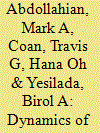

|
|
|
|
|
| Publication |
2012.
|
| Summary/Abstract |
The relationship between economic development, cultural change, and political liberalization is often explored through the lens of classic modernization theory. Recent scholarship attempts to extend classic theory to be more closely aligned with empirical reality. Under the human development perspective, economic prosperity acts as a catalyst for cultural development, leading to social values that favor liberalization, and thus promotes effective democracy. Using a systems dynamic approach, we formalize the dynamic causal structure specified in the human development perspective, develop a novel econometric procedure (Genetic Algorithm Nonlinear Least Squares) to estimate the parameters of highly nonlinear, continuous time models, and verify our formal model using five waves of data from the World Values Survey. Our results indicate that development is strongly nonlinear and path dependent: Economic progress is a necessary condition for successful secularization and expressive political behavior, which are antecedents for lasting democratic institutions. Thus, policies and institutional arrangements must be tailored to, not outpace, a nation's level of economic progress to create demand for a secular and expressive political marketplace where democratic institutions can sustain and thrive.
|
|
|
|
|
|
|
|
|
|
|
|
|
|
|
|
| 6 |
ID:
178715
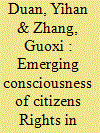

|
|
|
|
|
| Summary/Abstract |
This article explores the process and causes of the emerging consciousness of citizens’ rights in China. Using data from a nationally representative survey on the current state of fairness and justice in China in 2014, it presents an empirical study on the features of the generational variation of Chinese citizens’ emerging rights consciousness as well as the factors that contribute to the variation. Previous research has attributed the rise of citizens’ rights consciousness in China to democratization and political liberalization. In the absence of full democracy in China, however, findings from this article demonstrate that the forces of marketization can directly lead to the awakening of the rights consciousness among Chinese citizens. The article also finds that China’s urbanization process has promoted the generational variation of the citizens’ rights consciousness.
|
|
|
|
|
|
|
|
|
|
|
|
|
|
|
|
| 7 |
ID:
115822
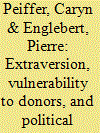

|
|
|
|
|
| Publication |
2012.
|
| Summary/Abstract |
In seeking to maintain their power, many African regimes rely on strategies of extraversion, converting their dependent relations with the external world into domestic resources and authority. This article assesses the relationship between extraversion and political liberalization, a dimension of African democratization that has been somewhat underappreciated in recent empirical studies. African countries vary in their extraversion portfolios, or the dimensions of their relations to the outside world that they can instrumentalize, and these variations correspond both to different degrees of vulnerability to the demands of foreign donors and to different preferences from the donors themselves. We find four quantitative measures of extraversion vulnerability to be statistically associated with the initial transitions of the 1989-1995 period and with the 'consolidations' at different levels of democracy observable between 1995 and 2011. These findings shed new light on both democratic and hybrid regime trajectories in Africa.
|
|
|
|
|
|
|
|
|
|
|
|
|
|
|
|
| 8 |
ID:
093235
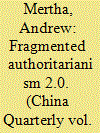

|
|
|
|
|
| Publication |
2009.
|
| Summary/Abstract |
Traditional analyses of political liberalization in China focus on elections or other facets of democratization. But they cannot account for the fact that although China remains authoritarian, it is nevertheless responsive to the increasingly diverse demands of Chinese society. I argue that the rules of the policy-making process are still captured by the fragmented authoritarianism framework, but that the process has become increasingly pluralized: barriers to entry have been lowered, at least for certain actors (hitherto peripheral officials, non-governmental organizations and the media) identified here as "policy entrepreneurs." With policy change as the variable of interest, I compare three cases of hydropower policy outcomes. I argue that policy entrepreneurs' ability to frame the issue effectively explains variation in hydropower policy outcomes. I then extend these findings to an unlikely policy area, international trade, specifically, the 2001-06 Sino-EU trade talks over child-resistant lighter safety regulations.
|
|
|
|
|
|
|
|
|
|
|
|
|
|
|
|
| 9 |
ID:
100602
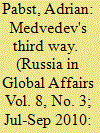

|
|
|
| 10 |
ID:
106722
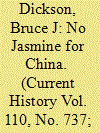

|
|
|
|
|
| Publication |
2011.
|
| Summary/Abstract |
Political protests in China are a far cry from those that created the Arab Spring.
|
|
|
|
|
|
|
|
|
|
|
|
|
|
|
|
| 11 |
ID:
076783
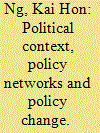

|
|
|
|
|
| Publication |
2007.
|
| Summary/Abstract |
Central to the debates on the transition of Hong Kong to Chinese sovereignty is how this process has affected change in the policy process and policy outputs. Many see policy change as a result of the evolving political environment in Hong Kong following the political transition. This article, however, adopts the notion of policy networks and argues that the analysis of policy change cannot be reduced to a simple contextual stimulus - the policy alteration model. A case study - 'the development of civic education' - demonstrates the importance of policy networks, as a particular structure of government and group relations in decision making, in explaining the course of policy change. It is apparent that the relationship between regime change and political liberalization, on the one hand, and established networks, on the other, tends to be complex and dialectical in Hong Kong. Despite the importance of sovereignty transition and political restructuring, the effect of contextual factors on public policy greatly depends on the nature of the network involved
|
|
|
|
|
|
|
|
|
|
|
|
|
|
|
|
| 12 |
ID:
133125
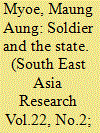

|
|
|
|
|
| Publication |
2014.
|
| Summary/Abstract |
The government of Myanmar is today publicly committed to building a 'modern developed democratic nation'. It has initiated a number of measures aimed at political and economic liberalization. This article examines the military's perception of the ongoing process of liberalization. It argues that, on the basis of mutual understanding and smooth relations between the government and the military at both individual and institutional levels, the military is likely to continue its support for the political liberalization measures initiated by the President and supported by the National Assembly. However, the military is not yet prepared to tolerate any structural changes that would undermine its national political role, the basic principles it has laid down for national unity, or its institutional autonomy.
|
|
|
|
|
|
|
|
|
|
|
|
|
|
|
|
| 13 |
ID:
127677
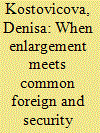

|
|
|
|
|
| Publication |
2014.
|
| Summary/Abstract |
During the process of visa liberalisation Serbia made significant and unexpected adjustments in its Kosovo policy, which demonstrate the European Union's leverage. Serbia's compliance on Kosovo cannot be explained either by rational institutionalism, which accounts for domestic change based on cost-benefit calculations, or sociological institutionalism, which predicts domestic adaptation based on convergence of norms and identities. Applying discursive institutionalism, this empirical study of Serbia's Europeanisation identifies discursive denial as a strategy of the Serbian elite in pursuing costly policy implementation. It contributes a novel perspective on 'shallow' Europeanisation by highlighting a lack of discursive reinforcement of adopted rules.
|
|
|
|
|
|
|
|
|
|
|
|
|
|
|
|
|
|
|
|
|